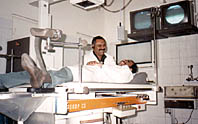
Kidney Problems in Yemen [Archives:1999/04/Health]
January 25 1999
Hospital admission records show that patients with kidney-related diseases constitute about 4% of the total. I have to hasten to caution against taking such statistics as hard and fixed, though the number does give an indication.
We do know however that there are many cases of renal failures, resulting in deaths. There is also hypertension due to renal diseases, and many cases of kidney stones. Renal failure, necessitating either kidney transplant or dialysis in a special center is needed for about 6000 patients per year.

In Western countries and in the more affluent part of the world, stones are becoming rare. One finds them in fact only in older persons, mainly males, with an obstructed outflow of urine such as in prostate enlargement. The Arabian Peninsula is one of the areas where urinary stones are still a common problem. In Dhamar hospital I carried out a small research for two years. We found that the disease mainly attacks boys (6 times more boys that girls). It was amazing to find that 55% of the stones occurred under the age of 10 years. While in the West most of the stones are found in the kidneys, in Dhamar we found 60% of the stones in the bladder.
The media in Yemen always stress the fact that health care in Yemen is bad and deteriorating. I have been working in Yemen for the last 14 years and I am happy to say that this is not true. Of course, I have to admit that with a per capita budget for health of 3 dollars per year, miracles should not be expected. But for example in the field of urology there are now two crushing machines (ESWL) and there is a specialist who can perform percutaneous removal of stones.
Yemeni urologists have performed kidney transplantation. Dialysis is available in most parts of the country, but of course the specialists face many problems with regard to maintenance and supplies. Many doctors and directors of hospitals including the minister of Public Health are intent to improve the health care in this country.
In February 1999, to be exact during February 16-18, the Disease Charitable Society together with the National Kidney Foundation, are organizing the first Yemeni Nephrology Meeting, which aims at improving the situation for patients with kidney problems. It will promote a better understanding of the kidney problem in Yemen, provide doctors with better knowledge about diagnosis, treatment and prevention of kidney diseases, and create awareness amongst the population on this issue.
I would like to urge all Yemen Times readers, businessmen, the pharmaceutical industry, politicians and the expatriate community to contribute financially to make this gathering a success.
Dr. J. Veerman
——
[archive-e:04-v:1999-y:1999-d:1999-01-25-p:./1999/iss04/health.htm]


